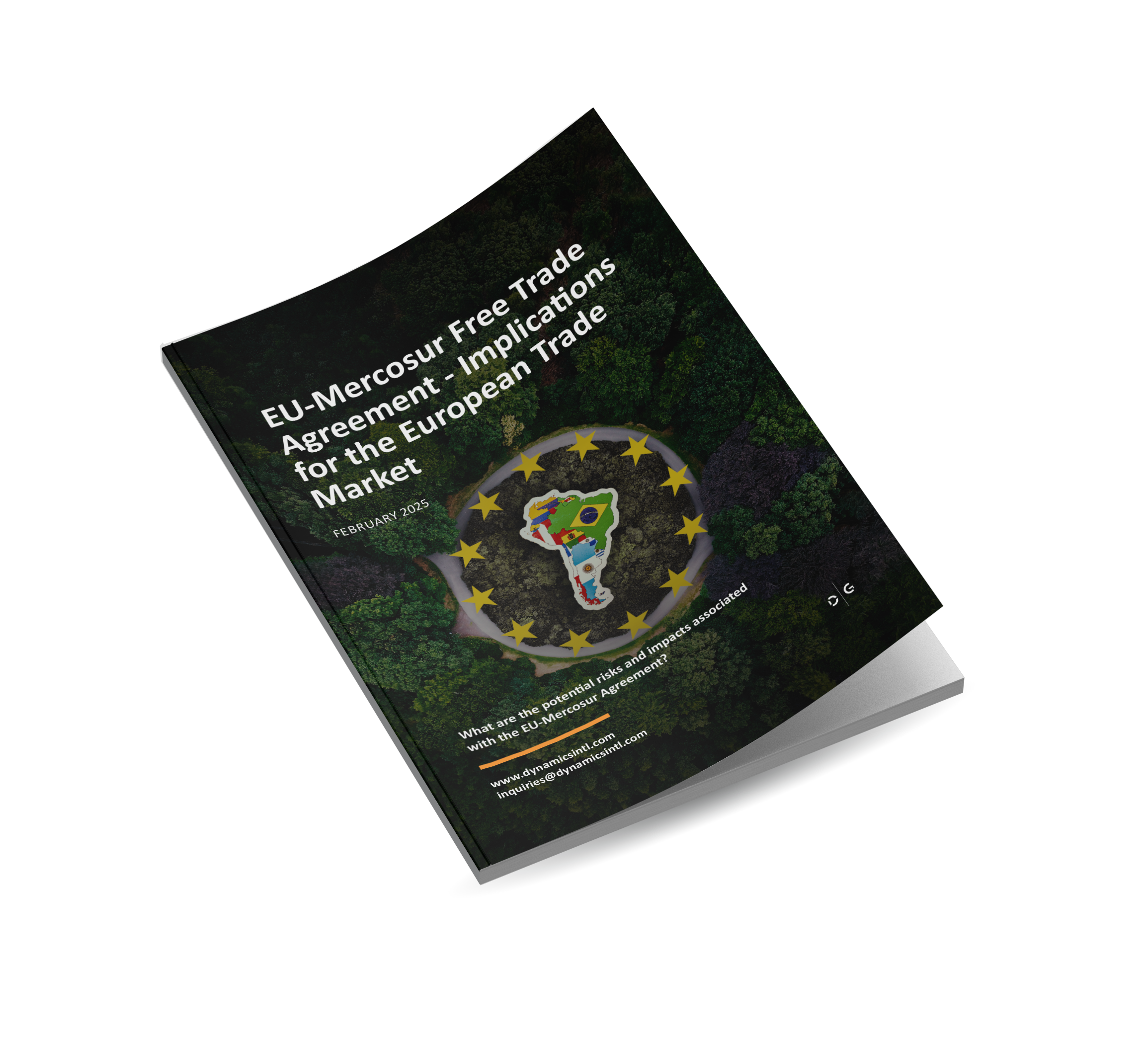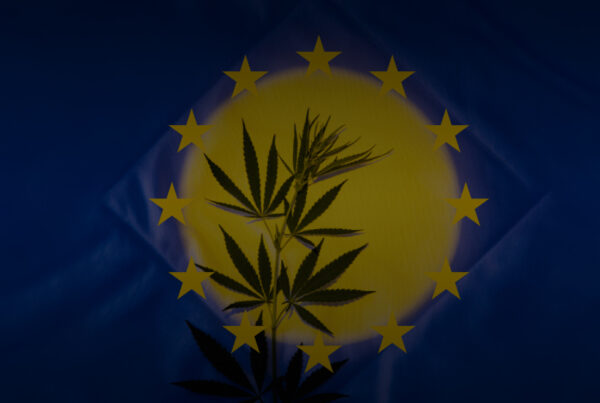Listen to the article – EU-Mercosur Free Trade Agreement – Implications for the European Trade Market
A Vast Economic and Trade Potential Unlocked
The EU-Mercosur trade agreement, finalized in December 2024, marks a considerable milestone in the global trade landscape, creating a free trade area with a combined population of 780 million people. The agreement aims to eliminate tariffs on over 90% of goods traded between the EU and Mercosur countries mostly including Argentina, Brazil, Paraguay, Uruguay and Bolivia. This deal promises substantial economic benefits, including the reduction of customs duties, with EU companies expected to save over 4 billion euros annually. However, the agreement has sparked considerable opposition, particularly from agricultural sectors in certain EU member states, such as France, Ireland and Austria. These groups are concerned that an influx of cheaper Mercosur agricultural products, especially beef and poultry, will undermine local agricultural markets and threaten the income of European farmers. The European farmers’ group COPA-COGECA, representing agricultural interests, has vocally opposed the deal, urging EU countries and the European Parliament to challenge its terms. This opposition has led to France attempting to form a blocking minority of countries within the EU in order to prevent its ratification.
In addition to economic concerns, environmental groups have expressed skepticism, particularly regarding the agreement’s impact on deforestation in the Amazon Rainforest. The deal comes at a time when the EU is focused on sustainability and climate change initiatives. Therefore, many critics fear that the agreement could undermine EU’s environmental goals by providing Mercosur countries with fewer restrictions on agricultural practices that contribute to deforestation.
To address these concerns, the European Commission has proposed a €1 billion compensation fund to support farmers who may be negatively impacted by the deal. This fund is intended to act as a precautionary measure, providing financial support in case of market disruptions. However, the exact conditions under which the fund would be initiated remain unclear and the ambiguity surrounding whether this will be a “reserve” or a “fund” has caused uncertainty among stakeholders.
How can we help?
Intelligence Solutions
The combination of business, market and strategic intelligence ensures result-driven outcomes for our customers.
Risk management
Risk management through the responsibility of taking risk ownership while ensuring safety and security
Strategic Advisory
The first step in protecting your organization, assets and people is the identification of the risks and threats.
While the EU-Mercosur trade agreement holds the potential for substantial economic growth and increased market access, the political and economic challenges are noteworthy to consider. The opposition from several EU countries, particularly in the agricultural sector, coupled with environmental concerns, means that the deal’s future remains uncertain. The coming months will be crucial in determining whether the agreement can survive the complex ratification process and secure the necessary political support.
Future Implications for the Trade Agreement
Future Implications for the Trade Agreement
As the provisions of the agreement continue to stir debate in the EU, more countries and political groups voice their support or opposition. Looking ahead, the EU-Mercosur trade agreement is set up to bring substantial economic opportunities, but its success will depend on how effectively the EU addresses both sectoral challenges and political opposition. The deal is expected to create a significant boost in EU exports, particularly in industrial goods such as cars, machinery and pharmaceuticals. The removal of tariffs on over 90% of traded goods is anticipated to enhance competitiveness in global markets. This will provide economic growth prospects for many EU businesses, opening a completely new market and fostering new trading alliances between EU countries and Latin America.
In terms of the political landscape, the EU will face a difficult path to secure the necessary support for ratification. The deal requires approval from both the European Council and the European Parliament, and the votes of several EU member states are uncertain. If the opposition persists, particularly from countries like France and Poland, it may be difficult to gain the required majority for ratification.
Furthermore, the deal may set the stage for future negotiations with other global partners, notably China and the United States. If the EU successfully navigates the political and economic challenges surrounding the Mercosur deal, it could pave the way for broader trade liberalization efforts. However, tensions within the EU including internal divisions over agricultural interests and environmental concerns may delay or even stop its full implementation, prolonging uncertainty for businesses, farmers and policymakers alike.
Overall, the future of the EU-Mercosur trade agreement hinges on EU’s ability to address agricultural, environmental and political concerns while capitalizing on the economic benefits of increased market access and export opportunities. If the agreement can secure the political support necessary and reach successful implementation, the long-term effects especially for Europe will be highly favorable.
Global Impacts from the EU-Mercosur Trade Deal
Global Impacts from the EU-Mercosur Trade Deal
If ratified, the EU-Mercosur trade agreement would significantly enhance EU’s economic outlook, increasing exports and fostering economic growth. A total of 357 European traditional products commonly known as geographical indications will receive a special status for protection against imitation under the auspices of the EU-Mercosur agreement, marking this as one of the largest coverage achievements negotiated in trade deals. This will secure and increase market share, as well as offer major encouragement for specialty food producers. Nevertheless, the agreement’s impact on European agriculture remains contentious. The safeguards and compensation mechanisms, while designed to protect vulnerable sectors, may not fully alleviate the concerns of critics, particularly in countries where agriculture plays a major role in the economy. Environmental groups are also concerned about the potential for weakened environmental standards, especially regarding deforestation in Mercosur countries. The EU-Mercosur trade agreement, once ratified, will have substantial and multifaceted impacts on both the European Union and the Mercosur bloc, with particular consequences for various sectors, the overall political dynamics and international trade relations.
Economic Impact: One of the most notable impacts will be the creation of a vast free-trade area encompassing 780 million people. Taking into consideration the new provisions of the agreement signed on December 6, 2024, in Montevideo, European products would receive a guaranteed entrance on the South American market (and vice versa) for better conditions than American or Japanese products, especially when it comes to agricultural goods. The value of such provisions would contribute to the formation of new trading and economic alliances, shifting global prices, economic power and reconfiguring global supply chains. In addition to benefiting EU exporters, the agreement will also create greater market access for Mercosur countries, particularly for agricultural products like beef, poultry, sugar and soybeans. While this promises to boost trade for Mercosur’s agricultural sector, it will create significant competition for EU farmers, who may struggle to compete with cheaper imports from South America.
Agricultural Sector Impact: The most controversial impact is likely to be felt in the agricultural sector. While Mercosur countries will benefit from expanded market access for their agricultural exports, EU farmers – especially in countries like France, Poland and Ireland – are concerned about the influx of cheaper imports, particularly beef and poultry. This could potentially disrupt European markets and harm domestic agricultural production. EU’s proposed 1 billion euros fund, intended as a safeguard for affected farmers, aims to mitigate these risks by providing financial support in case of severe disruptions. However, there remains uncertainty around the fund’s precise mechanisms, leading to continued anxiety among farmers about whether it will be sufficient enough to cushion the financial blow.
Download Report
EU-Mercosur Free Trade Agreement – Implications for the European Trade Market
What are the potential risks and impacts associated with the EU-Mercosur Agreement?
Environmental and Sustainability Impact: Another critical area of impact involves environmental and sustainability concerns. The EU-Mercosur deal includes safeguards to address deforestation and climate change, with the European Commission emphasizing that it is committed to the Paris Agreement. However, critics, particularly environmental groups, remain concerned about the sustainability of agricultural practices in Mercosur countries, especially in Brazil, where illegal logging and land-use practices in the Amazon have been linked to deforestation. While the agreement includes provisions to mitigate these impacts, the efficacy of these measures remains uncertain. The success of these safeguards will be a key point of scrutiny moving forward, and failure to implement them could damage the EU’s environmental credibility.
Political and Social Impact: The political ramifications of the deal are also significant. While the agreement offers potential economic benefits, it has sparked considerable opposition within the EU, particularly from countries with strong agricultural sectors and environmental concerns. France has been one of the most vocal critics, with President Macron leading efforts to block the deal. The political opposition from several EU member states could complicate the ratification process and cause political friction and deeper segregation among European nations. If the deal fails to gain the necessary support, the EU’s international trade strategy could be hindered and the potential for stronger relations with Latin America could be delayed. The agreement may also set the stage for future trade deals with other regions, notably with China and the United States, complicating even further diplomatic and international alliances. However, the challenges faced during the EU-Mercosur negotiations, particularly the internal divisions within the EU, could influence the approach to future trade agreements, particularly in terms of balancing economic interests with environmental and agricultural concerns.
Global Trade Relations: On a broader scale, the EU-Mercosur deal marks a significant shift in global trade relations. It strengthens ties between the European Union and South America, paving the way for a larger role for Mercosur on the global stage. However, the deal’s complexity and the internal opposition it faces may set a pattern for the negotiation of future trade agreements, especially in regions with diverse economic and political interests. Consequently, the EU-Mercosur trade agreement will have far-reaching economic, agricultural, political and environmental impacts. While the deal presents significant opportunities for trade and economic growth, especially for EU exporters and Mercosur’s agricultural sector, it also faces challenges that could undermine its full benefits if not carefully managed.
Potential Risks Associated with the
EU-Mercosur Agreement
Potential Risks Associated with the EU-Mercosur Agreement
The risks associated with the EU-Mercosur trade agreement are not to be undermined, spanning from economic, political, environmental and social domains. While the deal offers considerable opportunities, particularly for expanding market access and boosting economic growth, these risks – if not carefully managed – could lead to disruptions in agricultural markets, environmental harm, political divisions within the EU, social unrest and strained relations with key global partners.
Market Disruption for EU Farmers: The primary economic risk involves the potential disruption to European agricultural markets. With the influx of cheaper agricultural products from Mercosur countries, EU farmers could face significant competition, threatening their existence. As a result, local agricultural sectors might experience enormous market turmoil due to such boomerang effects, contributing to unstable local economies among EU member states.
Uncertainty Over Safeguards: Although the agreement includes precautionary mechanisms such as tariff-rate quotas and a bilateral safeguard clause, these provisions may not be enough to fully protect vulnerable sectors. The safeguards are temporary and may not address long-term market shifts or unforeseen economic consequences, especially if Mercosur exports surpass expected quotas or if non-tariff barriers (such as regulatory standards) are not enforced effectively.
Vulnerable EU Agricultural Sectors: While the agreement promises to protect some sensitive sectors, the risk remains that certain EU agricultural products, especially those that cannot be effectively shielded by quotas or tariffs, may face overwhelming competition. The long-term sustainability of some European agricultural industries could be at risk, particularly in countries with large farming sectors that rely on EU subsidies.
Ratification Challenges: The ratification process poses a significant political risk. The deal requires approval from the European Council and the European Parliament, but internal opposition – particularly from countries like France and Poland – may prevent the agreement from reaching its final stages. If the required votes are not secured, the deal could be delayed or blocked entirely, undermining the EU’s trade strategy and diplomatic relations with Mercosur countries. This in turn could result in strained diplomatic relations between the EU and Latin America.
Internal EU Divisions: The ongoing opposition from several EU member states, with France threatening to build a blocking minority, risks deepening strategic and political divisions within the Union. These internal rifts could strain relations between EU member states and weaken the EU’s negotiating power in future trade discussions. Countries like Ireland and Austria have also expressed reservations, placing an opposed front against European nations who are in full support and are pushing forward for the deal’s ratification. Such internal divisions not only widen the gap between EU members on key economic and trade issues but also create additional political tension that could lead to strained diplomatic relations between EU leaders making it virtually impossible to reach a consensus on future agreements.
Mercosur’s Internal Disunity: Within Mercosur, internal political clashes may also undermine the effectiveness of the agreement. Tensions between countries like Brazil and Argentina over trade policies, regional integration and external relations (for instance Uruguay’s pursuit of an FTA with China) could complicate the implementation of the agreement. These divisions could create friction that weakens the bloc’s ability to present a unified front in future negotiations.
Deforestation and Climate Impact: One of the most significant environmental risks involves the agreement’s potential impact on deforestation and climate change, particularly in Brazil, where illegal logging and land-use practices in the Amazon have been linked to environmental degradation. Although the EU has included provisions to combat deforestation, the effectiveness of these measures is uncertain. If these safeguards fail, the EU risks being seen as complicit in the environmental harm caused by Mercosur’s agricultural practices.
How can we help?
Intelligence Solutions
The combination of business, market and strategic intelligence ensures result-driven outcomes for our customers.
Risk management
Risk management through the responsibility of taking risk ownership while ensuring safety and security
Strategic Advisory
The first step in protecting your organization, assets and people is the identification of the risks and threats.
Sustainability Challenges: Despite the agreement’s sustainability provisions, critics argue that the terms may not go far enough to enforce real environmental protections. The EU’s credibility on environmental issues could be damaged if the trade agreement leads to increased environmental degradation, particularly if the demand for Mercosur agricultural products drives unsustainable practices. The risk of backlash from environmental groups could also harm the EU’s reputation as a leader in global sustainability efforts.
Displacement of Jobs in EU Agriculture: If EU farmers are unable to compete with cheaper imports from Mercosur, there is a risk of major job losses in the agricultural sector, which will most likely be felt in rural areas, negatively affecting local economies to the point of possible destabilization. This in turn could lead to social unrest and major protests, especially in countries where farming plays a central economic role.
Social Inequality in Mercosur Countries: While the agreement promises to boost Mercosur’s agricultural exports, the benefits may not be equally distributed across the region. The expansion of agricultural exports could exacerbate existing inequalities, with large agri-businesses reaping most of the rewards, while smaller farmers and rural communities continue to struggle. This could lead to social instability and resentment, both within Mercosur and towards the EU as an external actor.
Mercosur’s Trade Ambitions and Rivalries: Mercosur’s future trade negotiations could be further complicated by its members’ differing priorities. Brazil’s pursuit of closer trade ties with China, Argentina’s reluctance to allow more bilateral deals and Uruguay’s interest in joining the Trans-Pacific Partnership (TPP) all present risks to the bloc’s cohesion. If these internal divisions continue, it could undermine Mercosur’s ability to fully capitalize on EU’s agreement and complicate future negotiations with other global powers.
Strained Relations with Other Trade Partners: The EU-Mercosur deal could strain EU’s relations with other trading partners, particularly the United States and China. The US has historically been at odds with Mercosur members over trade and political differences, and China’s growing influence in South America – particularly through its Belt and Road Initiative – could alter the balance of power in the region. The EU’s focus on Mercosur might be perceived as neglecting other important international relationships, which could have broader geopolitical consequences.

ARTICLE | 17 PAGES






